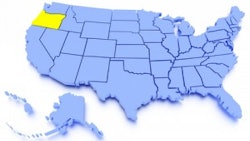
Pictured: Senator Jeff Merkley (D-OR), who introduced the Marijuana Business Access to Banking Act of 2015 in the Senate
By Noelle Skodzinski
Updated July 10, 2015, 3:03 p.m.
Could legal marijuana business owners soon be allowed to play on the same playground as other U.S. businesses? A growing number of bipartisan legislators are pushing forward to see that happen. As tax-equity bills already are under consideration in the U.S. House and Senate, and an Access to Banking Act is under consideration in the House, new legislation was introduced Thursday in the Senate to provide access to banking services for state-compliant cannabis businesses.
The Marijuana Business Access to Banking Act of 2015 would prevent federal banking regulators from terminating or limiting a depository institutions’ Deposit Insurance under the FDIC solely for providing services to a state-sanctioned and regulated marijuana business. It also would prevent the FDIC from penalizing financial institutions that provide financial services to legitimate and regulated marijuana business, and creates a safe harbor for those institutions.
“Providing access to basic banking services for legitimate cannabis businesses should be a no-brainer,” said Aaron Smith, executive director of the National Cannabis Industry Association (NCIA), in a press release announcing the legislation. “Without banks, many of our members are forced to operate entirely in cash, which puts their employees at risk for crime and creates massive challenges for businesses simply trying to pay their taxes, licensing fees and other ordinary expenses. The legal marijuana industry is worth nearly $3 billion nationwide. We shouldn’t be forced to carry that around in duffel bags.”
"One of the motivations for legalizing marijuana is to eliminate the black market and put marijuana in the hands of a legitimate regulated market,” commented Michael Collins, Policy Manager at the Drug Policy Alliance’s Office of National Affairs, in a press release. “Whether you are for or against legalization, you have to recognize that having marijuana businesses handling huge amounts of cash with nowhere to deposit the money is a public safety concern that Congress has to tackle.”
Dan Riffle, Federal Policy Director at industry advocacy organization Marijuana Policy Project (MPP), added, “In addition to the obvious public safety concerns cited by federal, state and local law enforcement officials, forcing these businesses to deal exclusively in cash makes it difficult for states to collect taxes, monitor transactions and enforce regulations supported by voters. Allowing these businesses to access basic banking services is a critical step toward letting states regulate marijuana as they see fit without federal interference, a position virtually every serious contender for the 2016 presidential nomination has taken."
The Marijuana Business Access to Banking Act of 2015 was introduced by Senator Jeff Merkley (D-OR), and co-sponsored by Senators Ron Wyden (D-OR), Corey Gardner (R-CO), Michael Bennett (D-CO), and Rand Paul (R-KY).
Similar legislation has been proposed in the House in recent years. The Marijuana Business Access to Banking Act of 2013—HR 2652—was introduced in the House in 2013 by Rep. Ed Perlmutter (D-CO), but did not pass. Rep. Perlmutter introduced a bill by the same name (the Marijuana Business Access to Banking Act of 2015—HR 2076) in late April; the bill has been referred to the House Subcommittee on Crime, Terrorism, Homeland Security, and Investigations.
This is the first piece of stand-alone banking-access legislation, however, to be introduced in the Senate.
According to the NCIA's press release announcing the legislation, "the introduction of this historic bill is an important first step in gaining support in the Senate and ultimately opening the banking system to all legitimate cannabis businesses. There is still much that needs to be done to advance this sensible policy."
Neither the House nor the Senate Access to Banking Acts require financial institutions to provide services to legitimate cannabis businesses.
The NCIA encourages industry constituents and the public to contact their U.S. Senators and ask them to co-sponsor the Marijuana Business Access to Banking Act. You can find phone numbers for your senators online by selecting your state here.
Will the Bill Pass?
While the fact that this legislation has been introduced in Congress and will be considered indicates huge strides for the industry and the U.S. Congress. However, whether or not the bill will pass is a different issue. "I don’t think either the House or the Senate version will pass in the 114th," the MPP's Riffle tells Cannabis Business Times. "That’s not because there isn’t support for this or for marijuana reform in general, but just because Congress doesn’t pass much of anything these days. What’ll be interesting is to see how it picks up support over the remainder of this term. Already Senator Warren has signed on as a cosponsor—the first marijuana bill she has cosponsored yet."
Also, Riffle adds, "if and when the financial services appropriations bill goes to the floor later this month, we’ll probably see amendments intended to give the marijuana industry access to banking pass, and that’ll be a good indicator of support for the bill and should ramp up pressure on the committee to hold hearings. I will say that whenever Congress gets around to passing marijuana legislation, [an "access to banking" bill] will probably be the first one that it does pass. The banking issue is such an obvious public safety and regulatory nightmare, which is why there’s near-universal support for addressing it."
The bill joins the Small Business Tax Equity Act of 2015, introduced in both the House and the Senate in April by Rep. Earl Blumenauer (D-OR) and Sen. Wyden, in the move to level the playing field from a business-tax perspective for cannabis businesses. The Tax Equity bills—S. 987 (now with the Senate Finance Committee) and H.R. 1855 (now with the House Ways and Means Committee)—would create an exception to Section 280E of the IRS tax code that would allow legal cannabis businesses in compliance with state law to take normal business expense deductions, like all other legal businesses. Currently, 280E prevents cannabis cultivators and dispensaries from deducting those common business expenses, including rent, payroll and state excise taxes.
S. 987 is co-sponsored by Sen. Merkley and Sen. Michael Bennet (D-CO). H.R. 1855 has been co-sponsored by Reps. Dana Rohrabacher (R-CA), Adam Smith (D-WA), Richard Hanna (R-NY), Jared Polis (D-CO), and Don Young (R-AK).

























